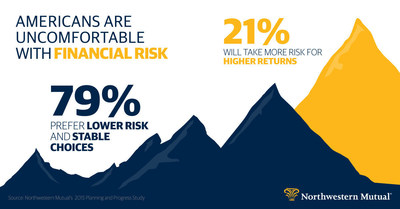
News Releases
MILWAUKEE, June 9, 2015 /PRNewswire/ -- It's been 46 years since Woodstock, which drew 400,000 young people to upstate New York for three days of free music and art in 1969. It was a defining moment for the Baby Boom generation, and galvanized a counterculture movement that was all about challenging the status quo and pushing the boundaries of freedom. That sentiment may seem a long way off to today's Baby Boomers (Americans aged 50-68) who, according to the 2015 Northwestern Mutual Planning & Progress Study, are playing it safe across just about every aspect of their lives.

While just shy of being as conservative as Matures (aged 69+), Baby Boomers are considerably more risk-averse than Gen X and Millennials in areas such as their social lives and career choices; where they choose to live and how they manage their money. And – get this – they're the nation's slowest drivers by far.
It's Not Just Baby Boomers. Risk-Aversion is High Across the Board…and On the Rise.
Across all generations, Americans are uncomfortable with taking risk, and have gotten even more risk-averse since the height of the financial crisis. Compared with the fall of 2008, one third (32%) of Americans are less comfortable today taking risk with their finances; one fifth (20%) are less comfortable taking risks in their careers; and more than one fourth (28%) are less comfortable taking risks with their healthcare coverage.
"The findings from our study show just how sensitive Americans are to risk – which, as a financial instinct – is a good thing," said Rebekah Barsch, vice president of planning and sales at Northwestern Mutual. "What sometimes is overlooked, is how to build risk protection into your plan—like insurance solutions to help navigate the unexpected."
The 2015 Northwestern Mutual Planning & Progress Study dug further into exactly where Americans of all ages are receptive to taking risks in their lives, and found the following:
- Finances – 79% prefer lower risk and more stable savings and investments vs. 21% who prefer taking calculated risks in the pursuit of higher returns.
- Social Relationships – 75% say they stick close to the friends they already have, not because they're uninterested in forming new relationships, but specifically to avoid taking chances socially. Only one-fourth (25%) say "I put myself out there and take chances socially because I love the prospect of forming new friendships / relationships."
- Career – 70% prefer the consistency and stability of staying with one employer vs. 30% who welcome the risk of making a job/career change for the prospect of greater success/happiness.
- Home – 81% prefer the stability and consistency of living in one place long-term, even if an opportunity to move could potentially result in career and/or financial growth. Only 19% say they prefer the adventure of starting over, and welcome the opportunity to move in order to experience something new and possibly better.
Eating and Driving -- The Two Areas Where Americans Do Take Some Risk
While people are playing it safe with their money, careers, relationships and home lives, there are two parts of their lives where they are throwing some caution to the wind:
- Diet – Half (50%) say they are more inclined to live in the moment and enjoy foods that they know are not particularly good for them.
- Driving – More than four in ten (44%) tend to drive fast in order to get where they are going as quickly as possible.
Looking across the full study findings, people follow some expected risk-taking patterns – the financial risk-takers are also more likely to be the social risk-takers. Interestingly, though, people who eat the right foods are more likely to feel financially secure; feel good about the economy and their financial situation; and have taken steps to address outliving their savings.
"When we work with clients – often over the arc of an entire lifetime – we go to great lengths to understand the whole person," said Barsch. "We believe there's so much to learn beyond the asset and liability columns of someone's life. And we see connections like these all the time – people who make good decisions about the long-term do it across many aspects of their lives and we see the dividends it pays every day."
Barsch added, "As for the fast drivers and poor eaters out there, what might seem like small risks in the moment can, of course, lead to something far more concerning. Simple lifestyle choices do matter—check out this fun lifespan calculator to learn more."
Boomers have less appetite for risk than Gen X and Millennials
Going back to the Woodstock generation, Baby Boomers' aversion to risk stands out against the two generations they precede – Gen X and Millennials. Comparing risk appetites in the same categories as outlined above, the Northwestern Mutual study finds:
- Finances –83% of Boomers, not surprisingly, are more comfortable playing it safe with their savings and investments as compared to 74% of Gen X and 71% of Millennials;
- Home – 88% of Boomers prefer staying where they live long-term, even if an opportunity to move could potentially result in career/financial growth, as compared to 77% of Gen X and 65% of Millennials
- Career – 72% of Boomers prefer the stability of staying with one employer over taking the risk of making a career move, as compared to 67% of Gen X and 59% of Millennials
- Diet – 55% of Boomers avoid foods they know are not good for their long-term health as compared to 43% of Gen X and 45% of Millennials
- Social Relationships – 76% of Boomers are more inclined to stick with the friends they have rather than take social chances, as compared to 74% of Gen X and 68% of Millennials
- Driving – 64% of Boomers never exceed the speed limit even if they're running late, as compared to 50% of Gen X and 50% of Millennials. Boomers drive even slower than Matures! Among those aged 69+, 57% say they never speed.
"While the idealism of youth is fantastic, so too is the pragmatism and practicality that often come with the experience of getting older," said Barsch. "As a proud member of the Baby Boom myself, I take pride in the choices my generation is making today. Playing it safe is cooler than you think."
About the Research
The 2015 Northwestern Mutual Planning & Progress Study explores the state of financial planning in America today, and provides unique insights into people's current attitudes and behaviors toward money, goal-setting and priorities.
This study was conducted by Harris Poll on behalf of Northwestern Mutual and included 5,474 American adults aged 18 or older (including 559 Baby Boomers age 50-68) who participated in an online survey between January 12, 2015 and January 30, 2015. Results were weighted to Census targets for education, age/gender, race/ethnicity, region and household income. Propensity score weighting was also used to adjust for respondents' propensity to be online. No estimates of theoretical sampling error can be calculated; a full methodology is available.
About Northwestern Mutual
Northwestern Mutual has been helping families and businesses achieve financial security for nearly 160 years. Our financial representatives build relationships with clients through a distinctive planning approach that integrates risk management with wealth accumulation, preservation and distribution. With $230 billion in assets, $27 billion in revenues, nearly $90 billion in assets under management in our investment products and services, and more than $1.5 trillion worth of life insurance protection in force, Northwestern Mutual delivers financial security to 4.3 million people who rely on us for insurance and investment solutions, including life, disability income and long-term care insurance; annuities; trust services; mutual funds; and investment advisory products and services. Northwestern Mutual is recognized by FORTUNE magazine as one of the "World's Most Admired" life insurance companies in 2015.
Northwestern Mutual is the marketing name for The Northwestern Mutual Life Insurance Company, Milwaukee, WI, and its subsidiaries. Northwestern Mutual and its subsidiaries offer a comprehensive approach to financial security solutions including: life insurance, long-term care insurance, disability income insurance, annuities, life insurance with long-term care benefits, investment products, and advisory products and services. Subsidiaries include Northwestern Mutual Investment Services, LLC, broker-dealer, registered investment adviser, member FINRA and SIPC; the Northwestern Mutual Wealth Management Company, limited purpose federal savings bank; and Northwestern Long Term Care Insurance Company.
Photo - http://photos.prnewswire.com/prnh/20150608/221583-INFO
SOURCE Northwestern Mutual